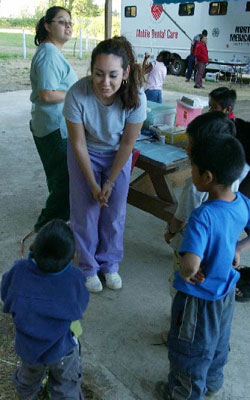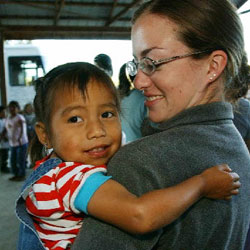
| Education | ||||||||||||||||||||||
|
One Man's Concern for Students Influences Many Lives |
||||||||||||||||||||||
|
Charlie Garcia always knew he wanted to work with youth. He just didn't know how thoroughly his dream would be realized.
As it turned out, he said, "It was a good fit, a wonderful fit. For me it was the start of an adventure of learning new things, setting new courses, and working with talented, energetic people." Under his direction, a summer enrichment program for minority students interested in medicine became a reality seven months later in the summer of 1989. Through MMEP, disadvantaged minority students were brought to medical school campuses for a six-week summer experience that Garcia called “a finishing school for medical school application.” Student lived on campus and witnessed what medical school is like. The experience helped them decide whether a career in medicine was something they wanted to do and believed they could do. That first group had 37 students in Seattle and an additional 140 students across five medical school campuses nationwide. In subsequent years, attendance grew. Now about 125 students participate in the Seattle area alone. Garcia said he used to begin the program each year by announcing the names of all previous participants who had entered medical school. When the list became too long, he reluctantly stopped reading it. Sixty percent of participants who apply to medical school are accepted. MMEP is an important contributor to diversity at UW School of Medicine and in medicine generally. Participants have gone on to almost every medical school in the United States, as well as abroad. "We have former MMEP students who have gone full circle. They have graduated from medical school and are mentoring students in MMEP," Garcia said. The satisfaction in his voice is unmistakable. The effort that began as a summer enrichment program grew and took new directions over the years. Experience taught Garcia that college students needed help earlier with critical thinking and basic sciences. As a result, an enrichment program called U-DOC was created for high school students in the WWAMI region.
Other initiatives were a cultural competency program on Spanish for the health professional, courses in traditional and non-traditional medicine, health care for needy populations, and how to treat patients from different cultural backgrounds. Efforts to bring minority issues to the forefront of medical research were also part of Garcia's agenda. His office pressed for research funding on the medical problems facing minority groups, such as high blood pressure among African Americans, diabetes among Native Americans, and the effect of pesticides on migrant populations. Garcia's job description changed over time. He went on to become director of Multicultural Affairs and, later, the first assistant dean for that office. In 2002, Garcia received the Distinguished Service Award from the Association of American Medical Colleges (AAMC) Group on Student Affairs-Minority Affairs. The award recognizes outstanding contributions to minorities in medical education. The unassuming Garcia credited UW Medical School's commitment of financial resources and emotional support, and the hard work of his colleagues, for much of his professional success. He added, “It has been a fun, exciting, challenging ride in a job that I was meant to have. These 15 years passed quickly.” These days, Garcia is a farmer in Rogue River, Ore. He’s up early doing chores and growing certified organic tomatoes and vegetables in his greenhouse. He said most of the crops in his fields right now are grass and weeds. He sees the parallels between his previous profession and farming, "In both, there is always something to repair or improve." Garcia knows all about breaking ground, working hard, and nurturing a quality crop. |
||||||||||||||||||||||
|
© 2003 - 2004 UW Medicine
Maintained by UW Health Sciences and Medical Affairs News and Community Relations Send questions and comments to drrpt@u.washington.edu |
||||||||||||||||||||||



